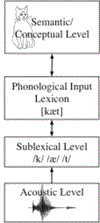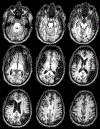Word deafness with preserved number word perception
- PMID: 30175931
- PMCID: PMC7065601
- DOI: 10.1080/02643294.2018.1515734
Word deafness with preserved number word perception
Abstract
We describe the performance of an aphasic individual, K.A., who showed a selective impairment affecting his ability to perceive spoken language, while largely sparing his ability to perceive written language and to produce spoken language. His spoken perception impairment left him unable to distinguish words or nonwords that differed on a single phoneme and he was no better than chance at auditory lexical decision or single spoken word and single picture matching with phonological foils. Strikingly, despite this profound impairment, K.A. showed a selective sparing in his ability to perceive number words, which he was able to repeat and comprehend largely without error. This case adds to a growing literature demonstrating modality-specific dissociations between number word and non-number word processing. Because of the locus of K.A.'s speech perception deficit for non-number words, we argue that this distinction between number word and non-number word processing arises at a sublexical level of representations in speech perception, in a parallel fashion to what has previously been argued for in the organization of the sublexical level of representation for speech production.
Keywords: Aphasia; category-specific deficits; numerosity; speech perception.
Figures
Similar articles
-
Making sense out of jargon: a neurolinguistic and computational account of jargon aphasia.Neurology. 1999 Nov 10;53(8):1813-24. doi: 10.1212/wnl.53.8.1813. Neurology. 1999. PMID: 10563633
-
Different patterns of spoken and written word comprehension deficit in aphasic stroke patients.Cogn Neuropsychol. 2011 Sep;28(6):414-34. doi: 10.1080/02643294.2012.673481. Epub 2012 Apr 10. Cogn Neuropsychol. 2011. PMID: 22489966
-
Speech perception, rapid temporal processing, and the left hemisphere: a case study of unilateral pure word deafness.Neuropsychologia. 2011 Jan;49(2):216-30. doi: 10.1016/j.neuropsychologia.2010.11.009. Epub 2010 Nov 17. Neuropsychologia. 2011. PMID: 21093464 Free PMC article.
-
Impairments of speech production and speech perception in aphasia.Philos Trans R Soc Lond B Biol Sci. 1994 Oct 29;346(1315):29-36. doi: 10.1098/rstb.1994.0125. Philos Trans R Soc Lond B Biol Sci. 1994. PMID: 7886150 Review.
-
Speech perceived through a damaged temporal window: lessons from word deafness and aphasia.Semin Speech Lang. 2008 Aug;29(3):239-52. doi: 10.1055/s-0028-1082887. Semin Speech Lang. 2008. PMID: 18720320 Review.
Cited by
-
Situating word deafness within aphasia recovery: A case report.Cortex. 2024 Apr;173:96-119. doi: 10.1016/j.cortex.2023.12.012. Epub 2024 Jan 26. Cortex. 2024. PMID: 38387377 Free PMC article.
References
-
- Anderson SW, Damasio AR, & Damasio H (1990). Troubled letters but not numbers: Domain specific cognitive impairments following focal damage in frontal cortex. Brain, 113(3), 749–766. - PubMed
-
- Bencini GM, Pozzan L, Bertella L, Mori I, Pignatti R, Ceriani F, & Semenza C (2011). When two and too don’t go together: a selective phonological deficit sparing number words. Cortex, 47(9), 1052–1062. - PubMed
-
- Brannon EM, & Terrace HS (1998). Ordering of the numerosities 1 to 9 by monkeys. Science, 282(5389), 746–749. - PubMed
-
- Breedin SD, Saffran EM, & Coslett HB (1994). Reversal of the concreteness effect in a patient with semantic dementia. Cognitive Neuropsychology, 11(6), 617–660.
Publication types
MeSH terms
Grants and funding
LinkOut - more resources
Full Text Sources
Other Literature Sources
Medical


